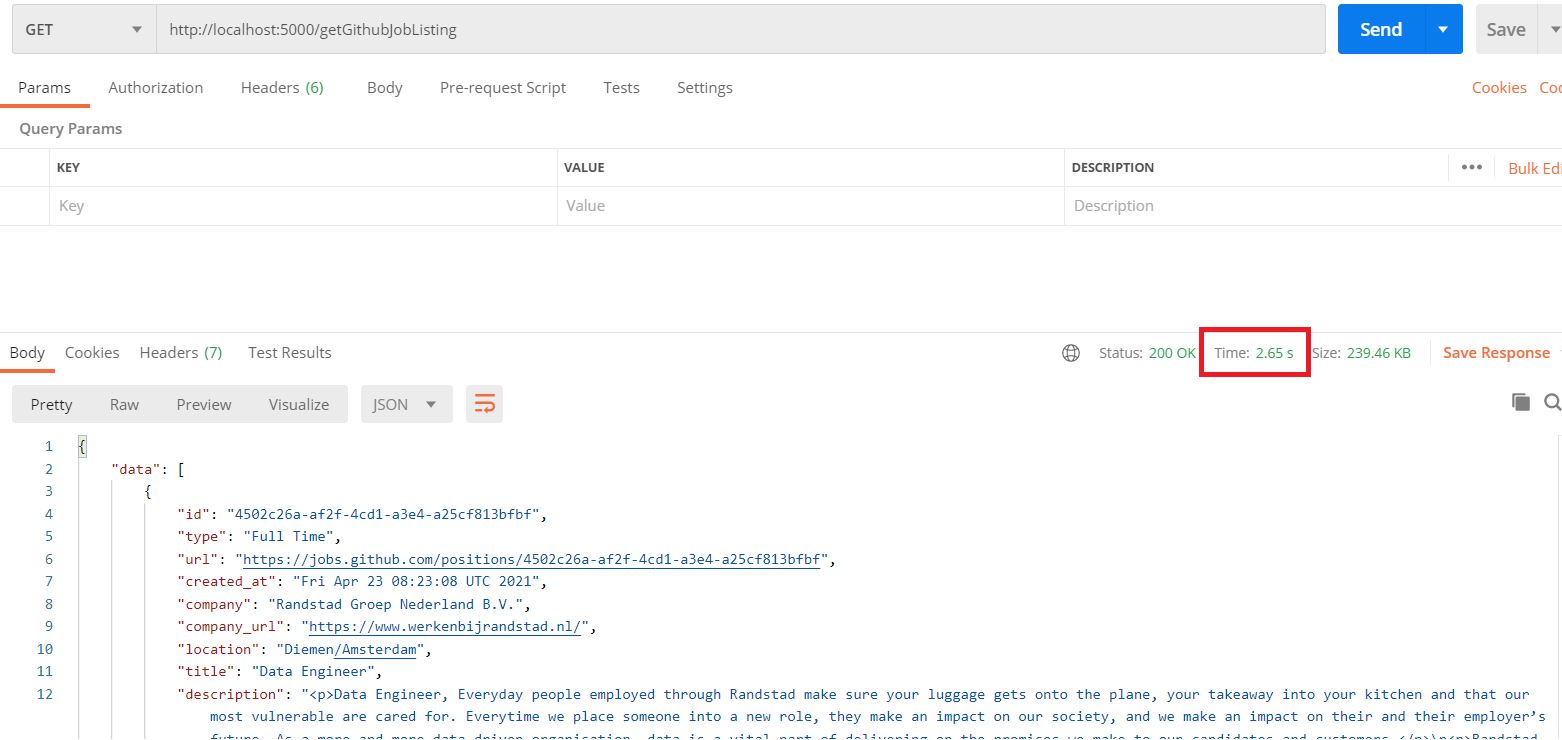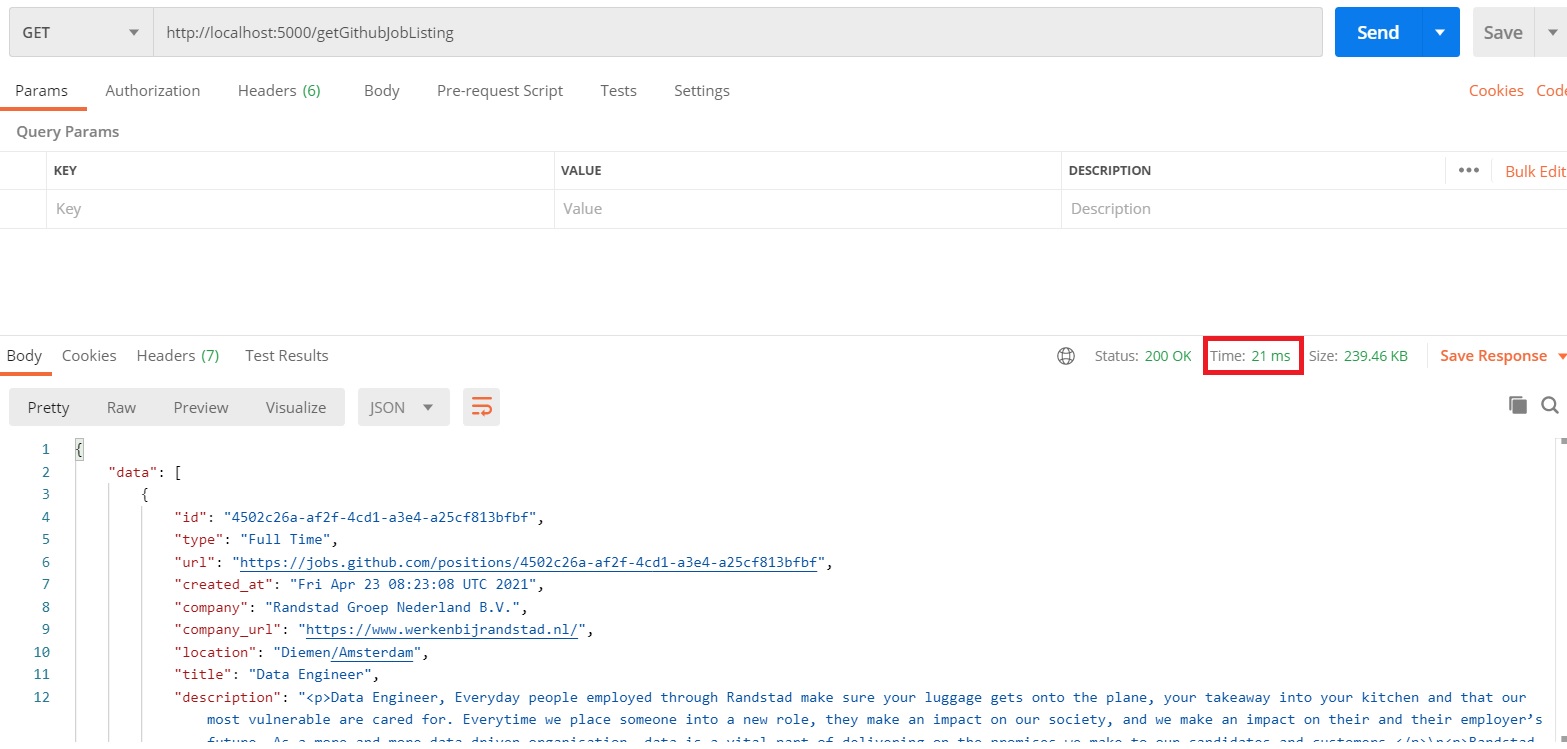Source code is available at » https://github.com/Jeffcw96/node-redis
In this article, let’s explore a little bit of how we can improve our application response time by using redis-cache approach.
- Import necessary packages and setup server
- Call API from GITHUB job listing
- Implement Redis-Cache approach in middleware
Prerequisites:
- Install Redis server in your machine.
- NodeJs.
- Packages needed to be install in this article: Express, Axios, Redis.
Import necessary packages and setup server
First of all, let’s import all necessary packages and start out server at PORT 5000
const express = require('express');
const axios = require('axios');
const cors = require('cors');
const redis = require('redis');
const app = express()
const util = require('util');
app.use(express.json({ extended: false }));
app.use(express.urlencoded({ extended: false }));
app.listen(process.env.PORT || 5000, () => {
console.log("server is running at 5000")
})Now, let’s initialize our redis client in port 6379 (default)
Let’s bind the redis-client command into promise to implement asynchronously via nodejs built-in method util.promisify instead of infinite callback
const client = redis.createClient({
host: 'localhost',
port: 6379,
});
client.on('error', err => {
console.log('Error ' + err);
});
client.on('connect', () => {
console.log('Redis is connected');
});
//Recommend to use
const clientLRANGE = util.promisify(client.LRANGE).bind(client);
const clientTTL = util.promisify(client.TTL).bind(client);
const clientRPUSH = util.promisify(client.RPUSH).bind(client);
const clientEXPIRE = util.promisify(client.EXPIRE).bind(client);
//Not recommend to use
client.LRANGE(< key >, (err, result)=>{ // do something here })
client.TTL(< key >, (err, result)=>{ // do something here })
client.RPUSH(< key >, (err, result)=>{ // do something here })
client.EXPIRE(< key >, (err, result)=>{ // do something here })
Call API from GITHUB job listing
Github offer an API where it will return the current job listing in their page.
Link »https://jobs.github.com/positions.json?description=api
Now, let’s create an API which will grab all the information from this Github API via axios.
app.get("/getGithubJobListing", middleware, async (req, res) => {
try {
const url = `https://jobs.github.com/positions.json?description=api`
const response = await axios.get(url)
await clientRPUSH("github:jobList", JSON.stringify(response.data)) //JSON stringify the data and store inside redis list data type
await clientEXPIRE("github:jobList", 120) //Set expiry time to 120 seconds
res.json({ data: response.data })
} catch (error) {
console.error(error.message)
res.status(500).send('Server Error')
}
})Result

Explanation
- Create an API and make an HTTP Request to https://jobs.github.com/positions.json?description=api
- JSON.stringify the response data and store them under Redis list with RPUSH command.
- Set the expiry time to 120 seconds for the particular redis key via EXPIRE command.
- As we can observe the response time from the image above, it’s around 2.7seconds which is really slow.
Implement Redis-Cache approach in middleware
Let’s implement a middleware where we will directly get the data from the redis <github:jobList> if it hasn’t expire yet.
const middleware = async (req, res, next) => {
try {
const redisData = await clientLRANGE("github:jobList", 0, -1);
if (redisData.length === 0) {
next()
return
}
const data = JSONParse(redisData);
res.json({ data })
} catch (error) {
console.error(error.message)
res.status(500).send('Server Error')
}
}Result

Explanation
- Try to get the data stored inside the key where we just placed the github job listing api data previously
github:jobList - If we managed to get the data which is Not Yet Expire. Response back with this data.
- Otherwise, use next() keyword to continue execute the command like what we did in last section
Extra
We can use redis TTL command to check how much time left for the expiry redis key.
The result will be -2 once it has completely expired
function checkExpiryTime(key) {
try {
const interval = setInterval(async () => {
let timer = await clientTTL(key)
console.log("timer ", timer)
if (timer === -2) {
clearInterval(interval)
}
}, 1000);
} catch (error) {
console.error(error.message)
}
}